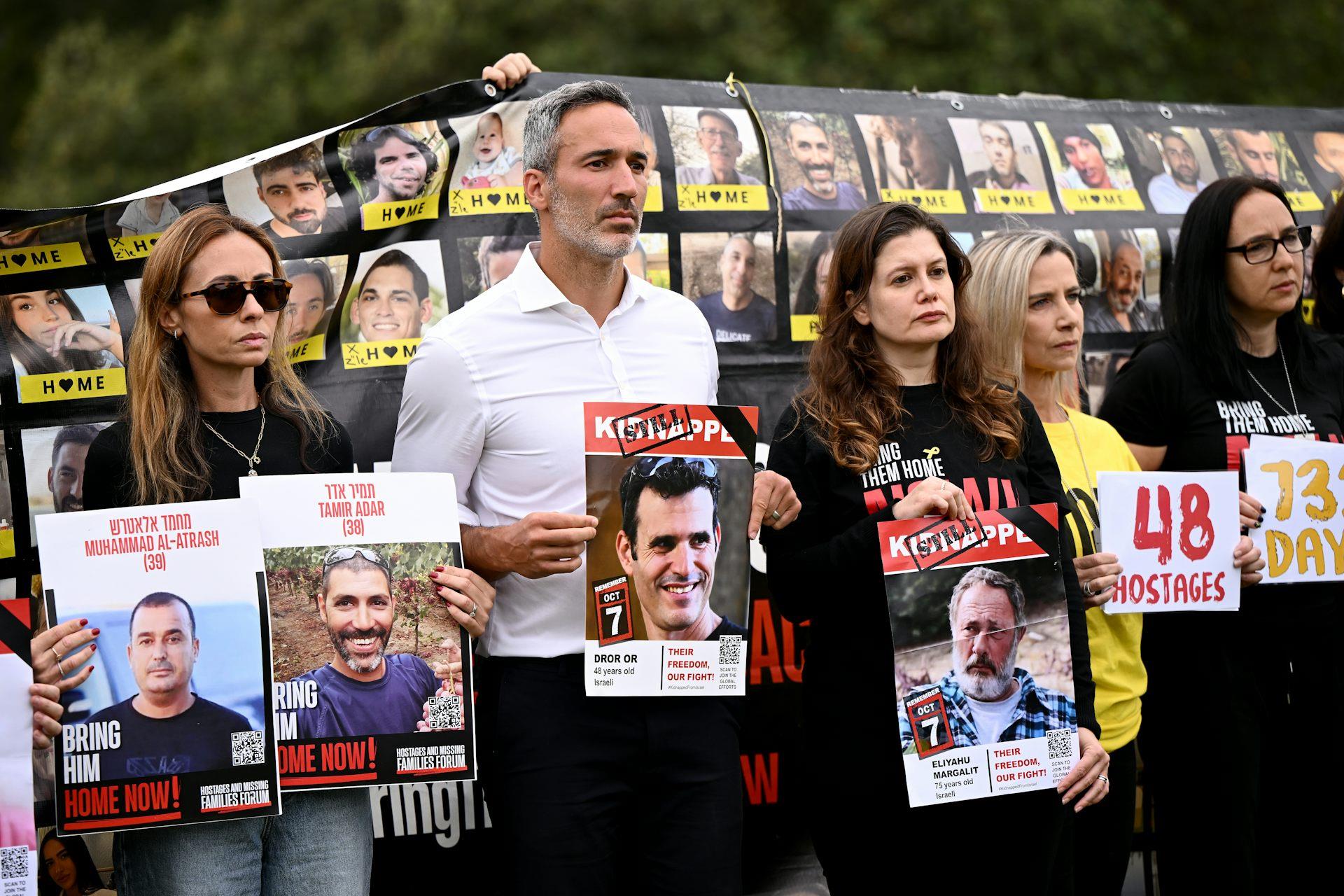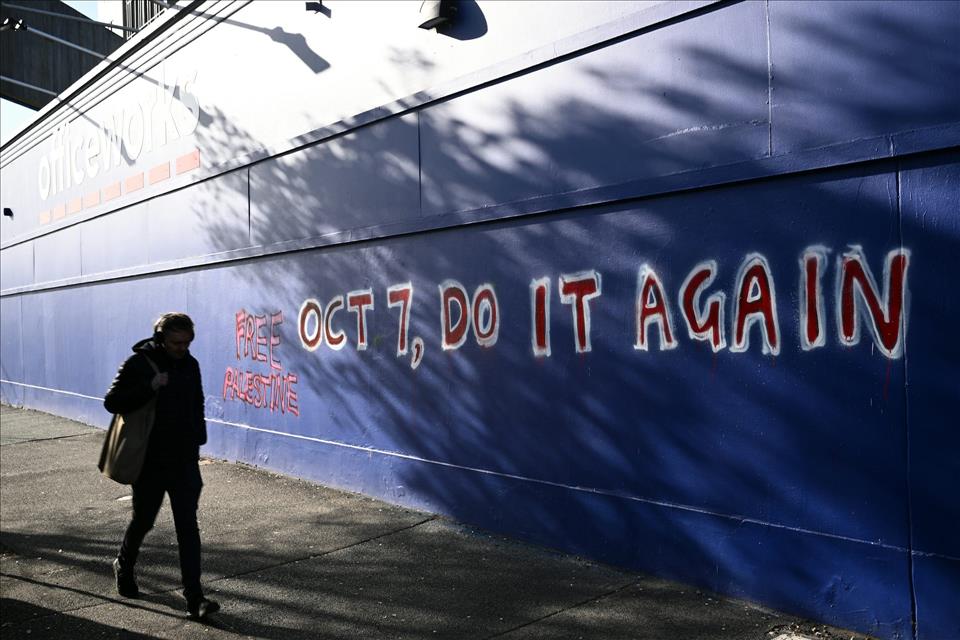
View From The Hill: Two Years Of A Distant War Have Brought Much Damage To Australian Society
Indeed, 24 months ago, who would have thought we'd have (or need) designated“envoys” to combat antisemitism and Islamophobia in Australia?
On Tuesday's second anniversary of the Hamas atrocities in Israel, it is sobering to reflect how much damage this horrific Middle East conflict, which has cost tens of thousands of lives, most of them Palestinian, has done to Australia's own society.
In Fitzroy in Melbourne, pro-Palestinian graffiti appeared to mark the anniversary:“Glory to Hamas”,“Oct 7, do it again”,“Glory to the martyrs”.
Prime Minister Anthony Albanese described this as“terrorist propaganda” that was“abhorrent,” saying those responsible“must face the full force of the law”.
On Wednesday, the issue of Sunday's proposed protest outside the Opera House will be back in court. The police don't want the protesters' march to be allowed to end in the tight space at the Opera House, citing dangers to safety.
The lawyer for the PAG said on Tuesday:“If the police application is conceded to, the ramifications for the right to protest in Australia will not be confined to the Opera House, but for a wide variety of protest activities”. The group argues the issue is a constitutional one.

Executive Council of Australian Jewry co-CEO Alec Ryvchin (centre) joins protestors as the hold placards of Israeli hostages following a press conference marking the two-year anniversary of the Hamas terrorist attacks against Israel. Bianca De Marchi/AAP
In the past two years, this faraway conflict has done substantial harm to Australia's social cohesion, raised questions about the future of multiculturalism, and produced serious divisions about where lines should be drawn on limiting free speech and the right to protest. The response of institutions, universities in particular, has been tested and in some cases found wanting.
NSW Labor Premier Chris Minns gave a flavour of the cross pressures when speaking on Sydney radio on Tuesday.
“We've moved significant changes to hate speech laws in New South Wales and we've done it because we recognise we live in a multicultural community and yes, you've got a right to freedom of speech but someone else has a right not to be vilified or hated on the basis of their race or religion. All of those laws are currently being challenged in the High Court because of the implied freedom of political communication.”
As hope, however tentative, is glimmering that the peace plan advanced by United States President Donald Trump just might bring a real breakthrough in this terrible war, the fissures it has produced in Australia seem as sharp as ever.
In two years, the Australian Jewish community has been embattled, with attacks on synagogues and other Jewish places, and many individuals deeply frightened for their own and their families' safety. Iran's intervention, behind at least two attacks, sought to stoke division.
In that time, the determination of Palestinian supporters has been steadfast, with regular weekend demonstrations maintained throughout.
The conflict has fractured the Australia-Israel relationship, with the Albanese government increasingly critical of Israel's unrelenting prosecution of the war, and the Netanyahu government turning on Australia.
Prime Minister Anthony Albanese makes a statement on the October 7 attacks before Question Time in the House of Representatives. Mick Tsikas/AAP
This culminated with Australia's recognition of a Palestinian state at the United Nations during the prime minister's recent trip. The recognition was the end of Labor's internal journey, which commenced many years before this war began.
The Greens Party have been at the left edge of the political spectrum.
The Australian community was divided about Palestinian recognition: an Essential poll published in late September showed 34% in favour, and 30% against.
The conflict has shattered what used to be a bipartisan Middle East policy, when both main parties strongly supported Israel and also backed a two-state solution for a long-term Middle East settlement.
Over the past two years, the Coalition has been strongly pro-Israel, accusing the Labor government of deserting an ally and failing to deal robustly with antisemitism in this country.
Opposition leader Sussan Ley used her parliamentary speech on Tuesday's anniversary to home in on the government's policy towards Israel.
“To our great shame, under the leadership of the Albanese Labor government, Australia has not stood with the people of Israel, nor with the United States, as they have sought to dismantle Hamas and establish the conditions for peace”.
The local rifts that have come to the surface in Australia were there well before October 7 2023. The war caused them to widen dramatically and explode.
Even if, and when, this conflict subsides, it will leave fractures, anger, bitterness and fear within sections of the Australian community.
Whatever healing takes place almost certainly won't be complete. For governments, federal and state, intractable policy challenges will remain.

Legal Disclaimer:
MENAFN provides the
information “as is” without warranty of any kind. We do not accept
any responsibility or liability for the accuracy, content, images,
videos, licenses, completeness, legality, or reliability of the information
contained in this article. If you have any complaints or copyright
issues related to this article, kindly contact the provider above.
Most popular stories
Market Research

- Forex Expo Dubai 2025 Returns October 67 With Exclusive Prize Draw Including Jetour X70 FL
- Xfunded Expands In Dubai, Strengthening Collaborations With Trading Influencers Across Europe
- SPAYZ.Io White Paper Explores Opportunities, Challenges And Ambitions In Payments Industry
- B2BROKER Taps Finery Markets To Power Institutional Crypto OTC On B2TRADER
- Zebu Live 2025 Welcomes Coinbase, Solana, And Other Leaders Together For UK's Biggest Web3 Summit
- Daytrading Publishes New Study Showing 70% Of Viral Finance Tiktoks Are Misleading



















Comments
No comment